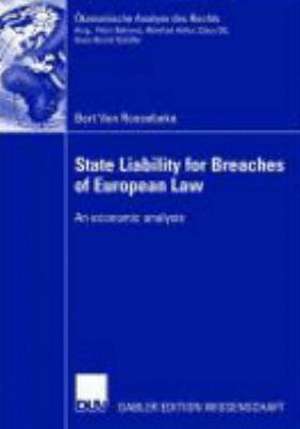State Liability for Breaches of European Law: An economic analysis: Ökonomische Analyse des Rechts
Autor Bert Van Roosebeke Cuvânt înainte de Prof. Dr. Hans-Bernd Schäferen Limba Engleză Paperback – 27 mar 2007
Din seria Ökonomische Analyse des Rechts
- 15%
 Preț: 444.45 lei
Preț: 444.45 lei - 13%
 Preț: 388.48 lei
Preț: 388.48 lei - 15%
 Preț: 442.48 lei
Preț: 442.48 lei -
 Preț: 447.84 lei
Preț: 447.84 lei -
 Preț: 444.35 lei
Preț: 444.35 lei - 15%
 Preț: 649.06 lei
Preț: 649.06 lei -
 Preț: 383.93 lei
Preț: 383.93 lei -
 Preț: 381.00 lei
Preț: 381.00 lei -
 Preț: 383.93 lei
Preț: 383.93 lei -
 Preț: 386.22 lei
Preț: 386.22 lei -
 Preț: 377.35 lei
Preț: 377.35 lei -
 Preț: 381.21 lei
Preț: 381.21 lei - 15%
 Preț: 639.08 lei
Preț: 639.08 lei -
 Preț: 379.68 lei
Preț: 379.68 lei -
 Preț: 317.90 lei
Preț: 317.90 lei - 15%
 Preț: 585.40 lei
Preț: 585.40 lei -
 Preț: 445.70 lei
Preț: 445.70 lei - 15%
 Preț: 442.66 lei
Preț: 442.66 lei - 15%
 Preț: 471.87 lei
Preț: 471.87 lei - 15%
 Preț: 478.24 lei
Preț: 478.24 lei -
 Preț: 480.44 lei
Preț: 480.44 lei -
 Preț: 445.49 lei
Preț: 445.49 lei - 15%
 Preț: 465.34 lei
Preț: 465.34 lei - 15%
 Preț: 444.14 lei
Preț: 444.14 lei -
 Preț: 421.34 lei
Preț: 421.34 lei -
 Preț: 351.88 lei
Preț: 351.88 lei -
 Preț: 419.43 lei
Preț: 419.43 lei -
 Preț: 411.54 lei
Preț: 411.54 lei -
 Preț: 453.60 lei
Preț: 453.60 lei -
 Preț: 481.97 lei
Preț: 481.97 lei -
 Preț: 314.80 lei
Preț: 314.80 lei -
 Preț: 355.70 lei
Preț: 355.70 lei -
 Preț: 412.89 lei
Preț: 412.89 lei -
 Preț: 349.36 lei
Preț: 349.36 lei - 15%
 Preț: 443.96 lei
Preț: 443.96 lei -
 Preț: 416.71 lei
Preț: 416.71 lei -
 Preț: 416.16 lei
Preț: 416.16 lei -
 Preț: 317.09 lei
Preț: 317.09 lei -
 Preț: 414.65 lei
Preț: 414.65 lei -
 Preț: 481.20 lei
Preț: 481.20 lei -
 Preț: 388.90 lei
Preț: 388.90 lei -
 Preț: 418.83 lei
Preț: 418.83 lei
Preț: 384.70 lei
Nou
Puncte Express: 577
Preț estimativ în valută:
73.62€ • 79.94$ • 61.84£
73.62€ • 79.94$ • 61.84£
Carte tipărită la comandă
Livrare economică 22 aprilie-06 mai
Preluare comenzi: 021 569.72.76
Specificații
ISBN-13: 9783835006539
ISBN-10: 3835006533
Pagini: 276
Ilustrații: XVII, 258 p.
Dimensiuni: 148 x 210 x 17 mm
Greutate: 0.34 kg
Ediția:2007
Editura: Deutscher Universitätsverlag
Colecția Deutscher Universitätsverlag
Seria Ökonomische Analyse des Rechts
Locul publicării:Wiesbaden, Germany
ISBN-10: 3835006533
Pagini: 276
Ilustrații: XVII, 258 p.
Dimensiuni: 148 x 210 x 17 mm
Greutate: 0.34 kg
Ediția:2007
Editura: Deutscher Universitätsverlag
Colecția Deutscher Universitätsverlag
Seria Ökonomische Analyse des Rechts
Locul publicării:Wiesbaden, Germany
Public țintă
ResearchCuprins
Basics of the European Union.- A First Look at Breaches. On their Existence, Explanations and the Court’s Answer.- (What and Why) Do Member States breach?.- Treating Breaches: The Law’s and the Court’s Answer.- The Aim of State Liability Regulation. What are we Really Looking for?.- Introducing Normative Law and Economics: Searching for an Aim of State Liability Law.- Are Breaches really that Bad? A Rationale not to allow Breaches.- Introducing Positive Law and Economics. Reaching the Aim.- Evaluation of the Current Situation: Two Distinct Enforcement Mechanisms.- Procedural Aspects. Private and Public Enforcement: Complements or Substitutes?.- Substantive Aspects of Public Enforcement: Deterrence by Fines?.- State Liability in Torts as a Law Enforcement Instrument. Does it work?.- Substantive Aspects of Private Enforcement: Deterrence by Damage Compensation?.
Notă biografică
Dr. Bert Van Roosebeke war Stipendiat des Graduiertenkollegs Recht und Ökonomie der Universität Hamburg. Er ist als wissenschaftlicher Mitarbeiter beim Centrum für Europäische Politik der Stiftung für Ordungspolitik in Freiburg tätig.
Textul de pe ultima copertă
In the European Union, member states not respecting European Law run the risk of being held liable in damages to citizens. As an alternative to this Francovich liability and on the initiative of the European Commission, the European Court of Justice may publicly fine states for breaching European Law according to Art. 228 of the European Community Treaty.
Using Law & Economics methods, Bert Van Roosebeke analyses non-contractual state liability in the European Union. He empirically explains differences in member states’ breaching behaviour and presents the state liability doctrine as developed by the European Court of Justice in a number of remarkable judgements. On the normative level, he embeds the issue of state liability in the existing Law & Economics literature and concludes that compliance is the true economic aim of state liability legislation. The author presents a comparative analysis of Francovich liability and public fining according to Art. 228 of the EC Treaty. He investigates the effectiveness of both private and public law enforcement mechanisms and – on the basis of a model of political decision-making and the influence of state liability –formulates improvements to the rules of state liability.
Using Law & Economics methods, Bert Van Roosebeke analyses non-contractual state liability in the European Union. He empirically explains differences in member states’ breaching behaviour and presents the state liability doctrine as developed by the European Court of Justice in a number of remarkable judgements. On the normative level, he embeds the issue of state liability in the existing Law & Economics literature and concludes that compliance is the true economic aim of state liability legislation. The author presents a comparative analysis of Francovich liability and public fining according to Art. 228 of the EC Treaty. He investigates the effectiveness of both private and public law enforcement mechanisms and – on the basis of a model of political decision-making and the influence of state liability –formulates improvements to the rules of state liability.







